Welcome to the twenty-third installment of More Than Words, where I take queer words of all sorts and smash them apart and see what makes them tick. Every week I’ll be dissecting a different word, trying to figure out where it came from, how it has evolved, where it might be going, and what it all means. It’s like reading the dictionary through a prism. Feel free to send word suggestions to [email protected].
Header by Rory Midhani
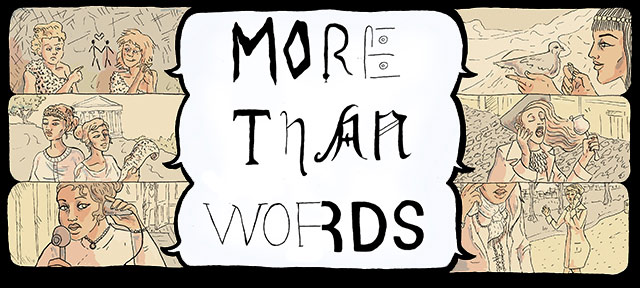
**HEY READERS, I know I told you I would keep talking about “feminism”, but things keep coming up that cannot be ignored (LIKE HALLOWEEN), and my hands really are tied. The F-Word miniseries will resume next time.
“Witch” is a shapeshifting, magical word. Just look at the average set of dictionary definitions. Merriam-Webster calls a witch “one that is credited with usually malignant supernatural powers; especially: a woman practicing usually black witchcraft, often with the aid of a devil or familiar.” I don’t claim to be more than a dabbler in the magical arts (though I was a Ravenclaw prefect within my high school’s underground Harry Potter parallel universe. Not to brag.) but it seems to me like there are a billion different words for magical humans, with all kinds of specialties (more every day!). And yet be a vaguely magical, vaguely misanthropic woman with a pet and you’re a witch no matter what. Seems reductive.
This vagueness is compounded by the word’s metaphorical cachet. If you are Darrin Stephens, The Eagles, or a sonnetteer, some witch has “cast a spell on you,” likely by looking winningly over her shoulder and making lemon meringue pies appear, and you’re in love with her despite your heartiest, most manly attempts to resist. If you’re a kid yelling at your older neighbor with the mean dog, or you’re whoever is in charge of making TV shows more family friendly via half-assed overdubs, a witch is an old crone, or a replacement for that worse, rhyming word. Can you think of any other word that means two such opposite things, and nothing in between? It’s practically its own antonym.
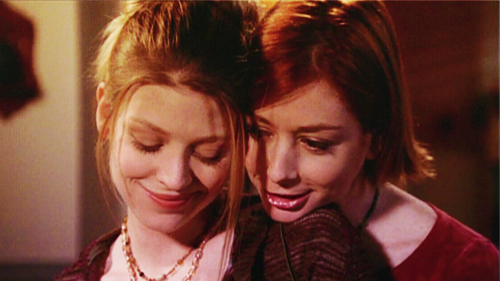
SHIPPING WITCH/WITCH COUPLES FOREVER
But from the beginning, people have been throwing the word around without being totally sure what it means. Ordinarily I start out these columns with a quick description of the word’s etymological root. It’s usually the most straightforward part—it’s after words are born, when they’re evolving and changing, that their stories generally become complicated. But the etymological origins of “witch” are really, really hazy (the OED prefers the word “uncertain,” but I like to say “hazy” or “murky” or “suffused with a strange, green, almost viscous fog, as though someone cast some kind of weird spell over history in order to cover its trail, perhaps via turning early etymologists into toads”). There is a whole Wikipedia article about the etymology of this one word, an article that includes the phrase “the further etymology of this word is problematic.” Experts have passive-aggressive sixteen-page fights over it in their warring “definitive” dictionaries. Did I expect this? No. Am I stoked about it? Maybe. Yes. Yes.
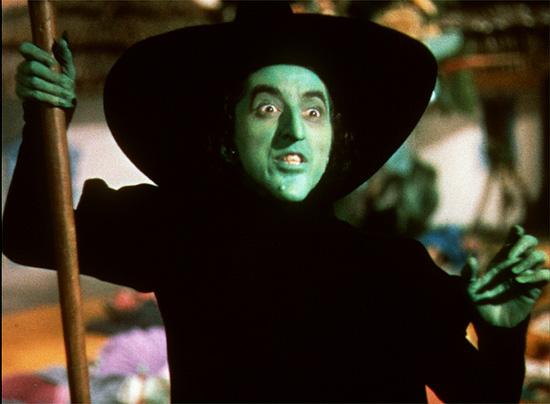
HELL YES
Let’s think of this like an ancient spell with some of the instructions blurred out by burn marks or mysterious fluids. A good first step is to lay out what we do know. The verb “wiccian,” which means “to practice magic,” pre-dated the Old English pair of “wicca” and “wicce,” meaning, respectively, “a man who practices magic” and “a woman who practices magic.”
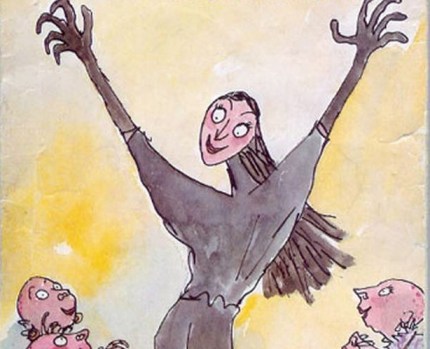
BOTH “WICCE” AND “WICCA” ALSO MAKE GREAT FILLER SOUNDS FOR BEATBOXING, LEADING TO THE POPULAR GENRE “WITCH HOUSE”
The root of “wiccian,” as well as how “wicce” occluded into “witch,” have been harder to figure out. But a good next step is to lay out what we know is wrong. People used to pair witches up with wizards, both in etymological history and at the Yule Ball. Heteronormativity aside, “witch” is a much older word than “wizard,” and was, historically, gender-neutral (when “wicce” and “wicca” transmogrified into “witch,” they—along with most of the English language—lost their gendered endings). By 1601, the unadorned “witch” was understood to refer to a woman, so a male witch was called a “he-witch,” as in “a he-witch… did but imitate, in his bungling way, the finer technique of the witch” (from The Proceedings of the New Jersey Historical Society, Vol. 7). And although “wizard” descends from old words for “wit” and “wisdom,” “witch” almost certainly does not.
So we know what we know, and we know what we don’t know. Time to lay out some of the things we think might be true. Since it’s so controversial, “witch” has become one of those words that linguists cultivate pet theories about. Its status as a fraught historical and spiritual category doesn’t help matters—as linguist Clive Scott explained, “superstition, whether religious or etymological, tends to distort the forms and meanings of words.” Anatoly Liberman, after spending scores of pages stirring through theories, upended his cauldron, concluding that “we do not know much more about the origin of “witch” than did our predecessors four, three, and two centuries ago… [no one can break] the spell laid by language on this word.”
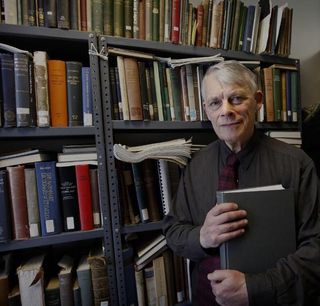
LIBERMAN WROTE A BOOK CALLED “GONE WITH THE WIND: MORE THOUGHTS ON MEDIEVAL FARTING.” WE CAN TRUST HIM
But people tried. After all, determining a witch’s past gives you a spin at her future. Jacob Grimm (of the Brothers Grimm), in his OTHER massive tome, the Deuthches Worterbuch (aka German Dictionary), says the word comes from *weik, a Proto-Indo-European root that means “to separate” or “divide.” He postulates that this led to the Gothic word weihs (“sacred”) because of cleromancy, the practice of throwing dice (or bones, or stones) to determine outcomes. In this theory, weihs became wicca/wicce via the West German *wikkon, and the original witches were diviners. Alternately, he says, it may have come from wicken instead, which means “to hop” or “dance,” in which case the original witches tended to dance a lot.
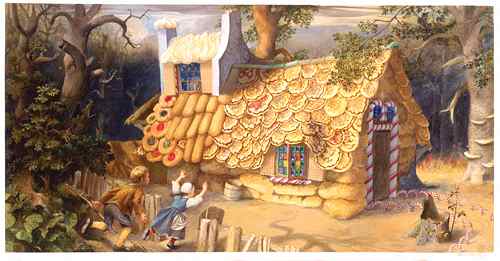
SURPRISINGLY GRIMM DID NOT MENTION THEIR TENDENCY TO MAKE TANTALIZING CANDY HOUSES.
Calvert Watkins thinks it’s related to *wikkjaz (“necromancer”) from the PIE *weg- (“to be strong, be lively”), because raising the dead is the most aggressively lively thing you can do. This would mean the original witches were less into examining the future, and more into reanimating the past. Meanwhile, Ernest Klein, in his Comprehensive Etymological Dictionary of the English Language, connects “witch” with the Old English wih, or “idol,” associating the word with false worship. Another theory holds that “witch” derived from a Middle High German/Middle Dutch family of words that mean “to rock” or “to sway” (German: wiegen; MHG/MDu: wigelen), “because conjurers used to roll violently.” “Wigelen” also became “wiggle” and would probably make a great name for a black cat. And yet another says “wicca” may be a cognate of Old English swegel (“sky”) and swegle (“bright/shining”) from PIE *uig (“twinkle, glitter”).
Regardless of the action or adjective from which the word was conjured, as soon as we started talking about witches we were trying to throw them out. The earliest recorded use of “wicca” is in 890’s Laws of Ælfred: “Ða fæmnan þe gewuniað onfon gealdorcræftigan & scinlæcan & wiccan, ne læt þu ða libban,” which translates to “Do not let the women accustomed to using magical arts and sorcery and witchcraft live.” A couple of decades later, Ælfric (maybe Ælfred’s cousin?), a grammarian rather than a lawmaker, still felt like he had to make a special exception in order to hate on witches: “Ne sceal se cristena befrinan tha fulan wiccan be his gesundfulnysse” (“A Christian should not consult foul witches concerning his prosperity”).
Consult them or no, people kept talking about them. The “t” popped up in “witch” in the 16th century, around when the word picked up its secondary senses of “an old woman I want to be mean to” and “a young girl I want to chase around a garden.” Several periods of Western history are characterized by the mass persecution of people accused of being witches. People started religiously and/or spiritually identifying as witches on a mass scale around the mid-20th century, thanks to Gerald Gardner and his Witch Cult. It makes sense that people are worried about not knowing where the word “witch” comes from. Something you can’t pin down holds power. It could become anything… and it’s almost Halloween.
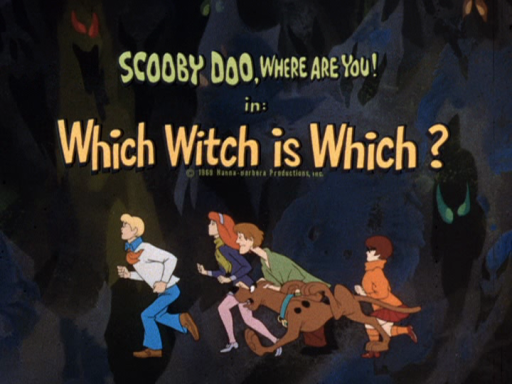
IF THEY KEEP FIGHTING OVER WHERE WE COME FROM, THEY’LL NEVER NOTICE WHERE WE’RE GOING!

This is my favorite More Than Words ever. Thank you for taking us on this bewitching journey, Cara.
I was always found the treatment of “witches’ super interesting so this was great! Also I’m a Ravenclaw and I was actually a prefect in high school, with a badge and everything, and I feel the need to put this piece of info out there.
Great article, thanks for the read!!
this is so excellent and so perfectly in time for my favorite holiday of the whole year, wherein i will dress up like a witch for at least one costume party, as i do faithfully every year, because actually i am a witch, probably, or at least identify strongly as witchy. growing up i was always really fascinated with the salem witch trials and the pure terror most men seemed to feel toward young women who behaved in ways that horrified or bewildered them AND older women who seemed to do just fine without a man of any kind, thank you very much. in fact, “telling” the carol matas book that first allowed me to identify as a feminist at age 9, includes a very interesting subplot about the salem witch trials and coming out in a world that doesn’t really accept strong women or queerness. ANYWAY all of this is to say i love witches, i love halloween, and i loved this more than words. not to sound like a professor or anything, but a-fucking-plus.
also i am also a ravenclaw. just fyi.
Okay, so I love all of this way too much, but hold the phone, I’m stuck on “my high school’s underground Harry Potter parallel universe”…was this actually a thing?? My friends and I running around in our graduation robes while screaming “ALOHOMORA” at closed doors in the school seems like small potatoes.
we all got really bored senior year and a piece of paper started getting passed around school… it had the name of everyone in the senior class along with their house and any special jobs/titles. everyone took it very seriously and made edits where appropriate. it was very accurate. no role-playing actually occurred (to my knowledge) but everyone just got a small boost from it.
that.is.magical.
You left out my favorite factoid! Western historical understandings of “witches” straddled (heehee) the maiden-crone divide along largely geographical and trans-Atlantic lines!!
Meaning, a witch in America was most likely a hideous old woman with satanic powers. A witch in Europe was most likely a beautiful beguiling maiden with satanic powers AND feminine wiles, which are basically superpowers, too.
Once again, everything is better in Europe.
i didn’t know about that! very cool. though i do have a soft spot for hideous old women with satanic powers.
This is amazing.
Also Ravenclaws unite.
I was just about to say Ravenclaws unite. For I am a Ravenclaw, too!
“LIBERMAN WROTE A BOOK CALLED “GONE WITH THE WIND: MORE THOUGHTS ON MEDIEVAL FARTING.” WE CAN TRUST HIM” Lmao.
Also, has anyone read “When God Was A Woman” by Merlin Stone? Because… I have not, but my girlfriend has, and when she was frantically discussing it with me in passionate bouts (I say that in the most loving way), I’m pretty sure there was a large bit on witches.
Very interesting article! As a practicing Wiccan I very often get called a Witch. I personally do not identify with the word but I am fascinated by how trendy the word itself has seemingly become lately! (Not to mention the sudden obsession with moon cycles, tarot, pentagrams and many other important Wiccan symbols. All screen printed on t shirts and available at your nearest Marshalls.)
I always look forward to More than Words. And to Halloween. So this was pretty much the best.
But probably the most important thing I’ve learned is that if anyone ever puts a sorting hat on my head, I’m going to close my eyes and beg to be put in Ravenclaw. Apparently, that’s where all the queers are.
“Can you think of any other word that means two such opposite things, and nothing in between? It’s practically its own antonym.”
It’s an auto-antonym! http://en.wikipedia.org/wiki/Auto-antonym#Examples
This article is amazing!!
First rule of Old English history: they’re ALL called Ælfric and Ælfred (aside from small smattering of occasions when they’re rather originally called Wulfric.) This makes referencing a fucking nightmare. The second rule is that whoever approaches OE history with enthusiasm will be struck down for their hubris.
What’s up, I check your blogs regularly. Your writing
style is witty, keep doing what you’re doing!